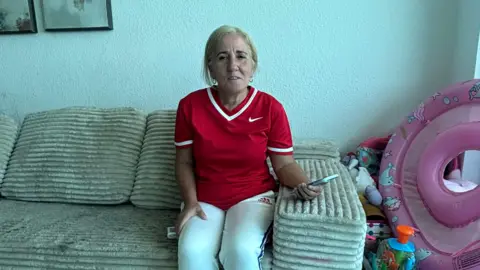When her son was taken into immigration custody, Yaneisy Fernandez feared the worst. Then she got a call from him inside Alligator Alcatraz.
We had no idea where he was until he called us, Yaneisy told the BBC. He said, 'mom, they took me to the facility of the crocodiles.' That's how he put it.
The temporary immigration detention centre built in Florida's Everglades has quickly become a polarising symbol of President Trump's immigration policy.
Now, just two months after it opened, the Department of Homeland Security (DHS) has said it will be shutting it down, in compliance with a judge's orders. The process is already under way - border tsar Tom Homan told the BBC during a press conference that only about 50% of the detainees remain.
The BBC spoke to the families of two inmates who were moved in the past month, who say that their loved ones disappeared into the system when they were at their most vulnerable.
That includes Yaneisy's son Michael Borrego Fernandez, who says he was left bleeding while in serious pain after a medical incident, before being moved to another facility.
Brought to the public's attention during its short existence, the facility was designed for around 3,000 detainees. However, it remained under capacity amid heightened scrutiny and protests regarding its conditions.
Reports emerged from within Alligator Alcatraz during its brief operational period, revealing varying conditions between perspectives of political figures. Republicans praised it as clean and safe while Democrats sounded alarms over what they deemed unsanitary living situations.
As the closure process begins, the emotional toll on families grows heavier. The stories of Michael, Yaneisy, and others echo the struggles faced by many inside the facility, symbolizing the larger issues within the US immigration system.





















